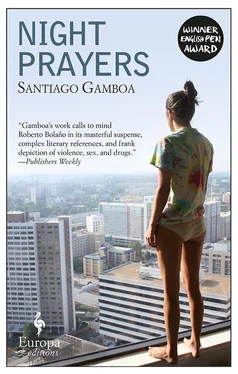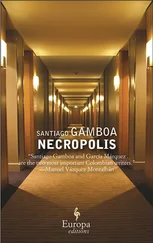That night, my friend Satoko Tamura, the translator, and her silent husband invited me to see the majestic view of the city from the tower on Rappongi Hills — an ocean of lights — and then to have dinner in the Ginza district, with its elegant commercial streets, luxury department stores, and buildings that are screens of liquid glass.
Back in my hotel room, already packing my bag to go back to Delhi, I asked myself why I had been so startled to discover that Juana was in Tehran, until I realized something incredibly obvious: Iran was one of the countries our embassy dealt with! so if, for example, she had requested a new passport or some other consular procedure, it would have had to pass through my hands. I myself would have signed it. I felt dizzy, thinking that I might be close. Unable to wait — it was Friday, I wouldn’t get to Delhi until Saturday — I sent Olympia a message asking her to look through the Tehran files for the name Juana Manrique and saying that we’d talk about it first thing on Monday.
When I got to Delhi, the heat was overpowering.
Every time I traveled anywhere else in Asia — perhaps with the sole exception of Kathmandu — I had the feeling when I got back that Delhi was a real slap in the face: its polluted air, smelling of smoke and kerosene; its streets filled with earth, garbage, and waste, its human anthills, the maddening noise of car horns and sudden accelerations; the permanent dust cloud and the sense that dengue and tetanus and malaria, in other words, everything that’s sickliest and most despicable, float in the very air you breathe; the fecal matter on the walls, the gobs of spittle, the humidity, the horrific diseases and deformities, all these counterpointed with the indolent look of those who survive, the absurdly insulting conspicuous spending of the rich in a country with eight hundred million poor, whose economy, roughly speaking, is based on the fact that two thirds of the population earns paupers’ wages, in short, all this became even more obvious on returning from a city like Tokyo where you don’t encounter unpleasant smells, not even in the fish market. Of course, its equivalent in Delhi is a place so dirty that the flesh of the fish is covered by a layer of several inches of flies.
I was tempted to go to the office on Sunday, but I wouldn’t have gained anything by it, because Olympia keeps her things under lock and key, so I spent the time organizing what I needed for the journey and in the afternoon went for a walk in Lodhi Gardens, a park that reconciles you with the city, being one of its few unconditionally beautiful and clean places, where you can lie down on the grass and listen to the cawing of the birds of prey, the parrots, the crows, the eagles, in other words, the birds of all sizes and types that are the real masters of the city.
By about seven on Monday morning, I was already on my balcony drinking a cup of strong coffee. Eagles were flying over the pines opposite and a group of workers was digging in Jangpura Park, converting what had been a very green lawn into a dusty stretch of earth. I couldn’t wait for Peter to pick me up and take me to the embassy, which, after a recent move, was now at 85 Poorvi Marg, still in Vasant Vihar but further back, far from the terrifying Olof Palme Marg and its crazed traffic.
As often happens in such cases, an element of suspense now crept in. Olympia wasn’t there, she had gone off with the chauffeur to deposit the monthly income from consular activities in the bank in Chanakyapuri, and wouldn’t be back until noon, so I went to the office to deal with other matters, such as studying visa requests and approving them — in the whole time I was there, I only ever denied one, to a Mephistophelian guru — answering mail, or discussing new cultural projects with my good friend Professor Aparajit Chattopadhyay of Jawaharlal Nehru University, a specialist on Neruda.
At noon, Olympia arrived and came up to my office, which was on the second floor of our three-story building.
“Look, boss, here’s your girl,” she said, and placed on my desk a passport renewal application from two months earlier, already signed by me.
I looked at it with genuine excitement. There it all was: telephone numbers, address, a recent photograph.
She had changed. Her hair was shorter. She was using her husband’s surname and was now called Juana Manrique Hedayat. Attached to the form was a request for a birth certificate and passport for a newborn child named Manuel Sayeq Hedayat Manrique, her six-month-old son. Everything seemed to be all right, so why had she forgotten her brother? when was she thinking of contacting him? Communications aren’t easy in Iran, but what was stopping her from sending an e-mail, a Facebook message, or making a long-distance telephone call?
All this was a mystery.
The form had the telephone number and a note that said: please call only between 9 and 11 A.M. I looked at the clock. It was after nine in the morning in Iran so I asked Angie, the secretary — the only member of staff with an international line — to call her and put her through to me in my office.
It isn’t easy to call Tehran, as I knew from having tried months earlier to send a batch of Colombian books to its book fair. Something as simple as talking to the person in charge of Latin America at the Foreign Ministry was impossible.
The telephone rang and I rushed to answer. I heard Angie say: “Madam Juana Hedayat? Please stay on the line, the consul wants to speak with you.”
“Juana?” I said.
At the other end of the line, through a storm cloud of electrical noise that sounded like a swarm of mosquitoes, I heard her say, yes, that’s me, is there some problem with my application?
“That’s not why I’m calling,” I said. “I’d like to talk to you about your brother Manuel.”
There was a silence that seemed even longer thanks to the heavy interference. I prayed that the line wouldn’t be cut off.
“Did you hear me?”
“Yes, Consul, what’s happened to my brother?”
“He’s in prison in Bangkok,” I said. “There was an incident and he was arrested. He was on his way to Japan to look for you.”
“What?” Her voice broke and there was more noise on the line, and sobs. At last she recovered and spoke again. “Manuel in prison in Bangkok? he was looking for me? but… is he all right? how did he know… and you?”
I took a deep breath and told her everything, from the beginning: the journey, the arrest, the pills. The communications with Colombia, the fact that Delhi had had to deal with the case because of the post in Malaysia being vacant, my own journey to Bangkok and Manuel’s version of events, his pressing need to see her again after three years, the urgency of her coming to Bangkok, all in all, I spoke for about ten minutes without interruption, without hearing anything at the other end except that noise like a failing engine on the line. When I stopped talking I heard her crying. Not broken sobs, but sustained weeping, as if a muddy current had found an outlet.
I let her cry without adding anything. Then she asked, sobbing, are you sure he’s all right? I assured her he was, Manuel was strong and was being well protected, the lawyer was influential and knew the warden of the prison, but I insisted: it’s vital that you travel to Bangkok, he needs to see you.
“Yes, Consul, but I have two problems. My husband won’t let me leave Iran and I don’t have a passport. Or rather, I have an Iranian passport I can’t use and a Colombian one that’s out-of-date. And besides there’s my son. I can’t leave without him, and he doesn’t have a passport.”
I told her the passports weren’t a problem, we’d deal with them immediately. She had presented the forms and they were already signed.
Читать дальше












